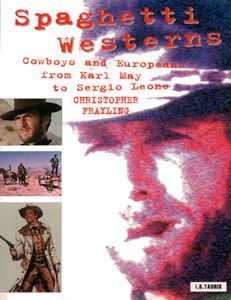Unfortunately, however, the book has been out-of-print for several years--with used copies commanding hefty price tags from collectors. Now, I.B. Tauris Publishers comes to the rescue with a "revised" paperback edition that features a new introduction by Frayling.
If you already own a copy of the first edition of Spaghetti Westerns, it's questionable whether you need to replace it. This revised edition, while a welcome addition to any film lover's library, hardly qualifies as "revised." Frayling's introduction is anecdotal and relatively brief. He lists "assorted errors" that readers uncovered in the first edition, but the book's text has not been revised to correct these errors. Also, when the book was originally written, Frayling adopted a "defensive" tone (as he confesses in the new introduction), which he used because he wanted to persuade people to take these movies seriously. However, today, when Spaghetti Western veterans such as Sergio Leone and Ennio Morricone are widely respected around the world, Frayling's "defensive" tone occasionally sounds strident--especially when he's reviewing the corpus of Western film criticism and attacking virtually everything written. But once Frayling gets beyond the historical context and begins discussing the movies themselves, his commentary is just as relevant today as when the book was first written.
Of particular interest are Frayling's chapters about Cinecitta Studios (the great Italian assembly-line producer of "Spaghetti Westerns"), the influence and relevance of Karl May (a German author whose "Winnetou" short stories became fertile terrain for early '60s West German Westerns), the films of Sergio Leone (with special emphasis on the "Dollars" trilogy and Once Upon a Time in the West), and the political context of the "Spaghetti Westerns." Along the way, you'll discover same fascinating sidelights: for example, one of the main inspirations for Sergio Leone's "Dollars" Trilogy was "The Puparri"--the marionette shows of traditional Sicilian theater.
As can be expected from any study of European Westerns, much of the book is devoted to discussing Leone's films. While other directors such as Sergio Corbucci (Django), Damiano Damiani (A Bullet for the General), and Carlo Lizzani (The Hills Run Red) made important contributions to the genre, Leone remains in a class by himself. Therefore, Frayling devotes four chapters to Leone: "Sergio Leone's Films--The Sources," "The 'Dollars' Trilogy--Decors and Detail," The 'Dollars' Trilogy--Analysis," and "Once Upon a Time in the West." (Not surprisingly, Frayling is working on a first ever biography of Italy's famous director--titled Viva Leone!)
In addition, Frayling provides a fascinating appendix, "The Impact of Spaghettis on the American Western," in which he examines how the weight of realism served to rob the Western of its vitality. You might not agree with everything that Frayling has to say about American Westerns, his comments about The Wild Bunch are bound to rankle many American readers, but his comments are always thoughtful and well considered.
Spaghetti Westerns is a landmark book that eloquently argues for the relevancy of the European Western and effectively skewers the notion that only American Westerns can be considered authentic visions of the frontier landscape.
Spaghetti Westerns: Cowboys and Europeans from Karl May to Sergio Leone by Christopher Frayling is now available in a revised paperback edition from I.B. Tauris Publishers. (Distribution by St. Martin's Press in the USA and Canada).
|
 Spaghetti Westerns
Spaghetti Westerns